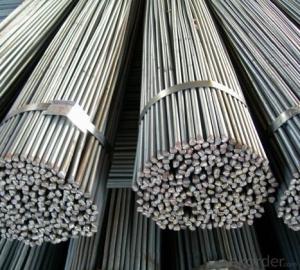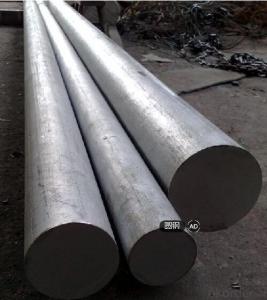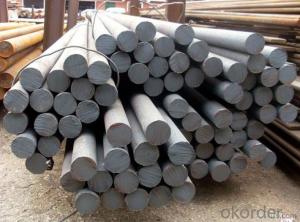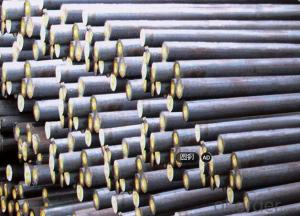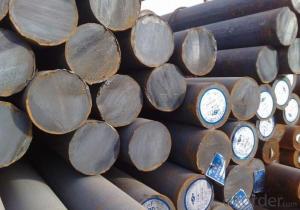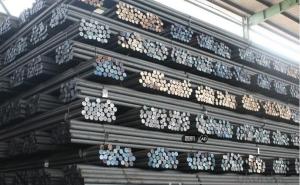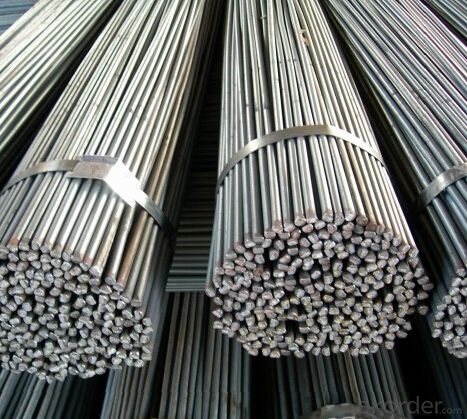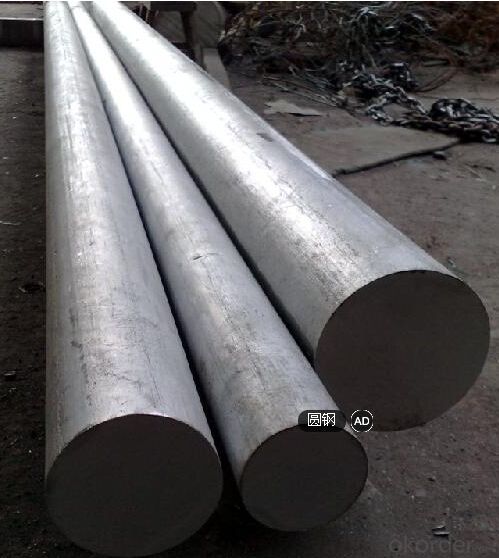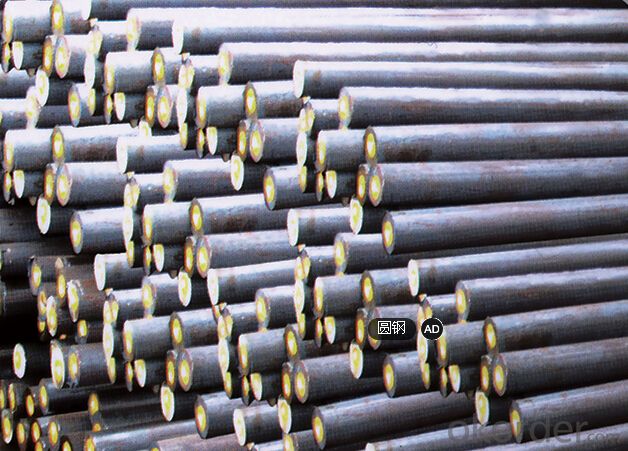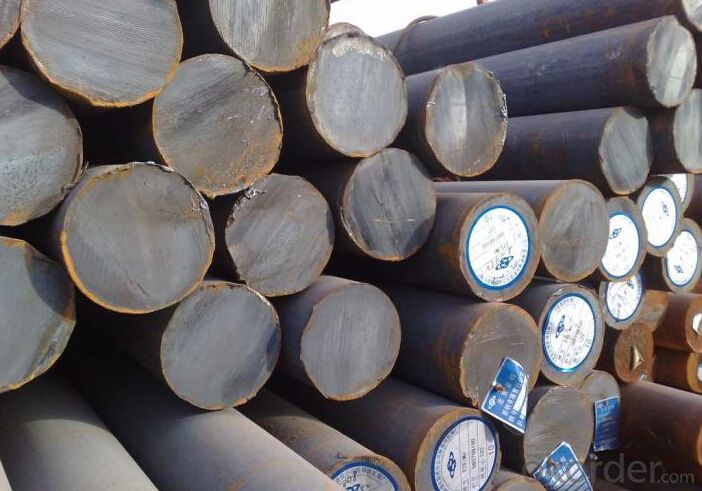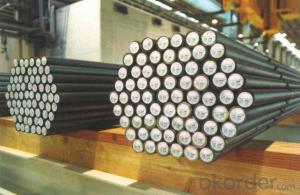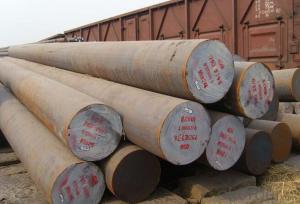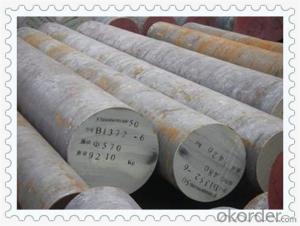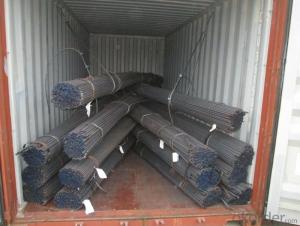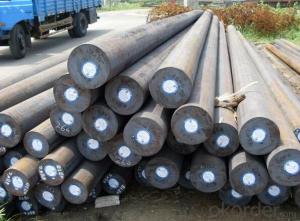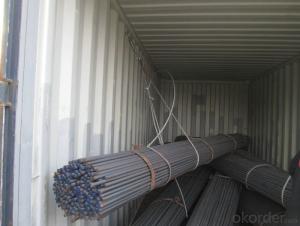Hot Work Die Steel Round Bar Grade H13 with Competitive Price
- Loading Port:
- Shanghai
- Payment Terms:
- TT OR LC
- Min Order Qty:
- 3 m.t.
- Supply Capability:
- 100000 m.t./month
OKorder Service Pledge
OKorder Financial Service
You Might Also Like
Specification
Hot Work Die Steel Round Bar Grade H13 with Competitive Price
Details Information of Hot Work Die Steel Round Bar Grade H13 with Competitive Price
| Name | Hot Work Die Steel Round Bar Grade H13 with Competitive Price |
| Shape | Round Bar/Square Bar/Flat Bar/Plate/Wire |
| Standard | GB/ASTM/SAE/AISI/DIN/JIS/EN/BS |
| Surface Treatment: | Black/Peeling/Polished/Machined |
| Delivery Condition: | Hot Rolled or Forged/Peeled or Black Surface |
| Test | SGS/UT 100% Elements Testing |
| Certificate: | ISO/Mill Certificate |
| Service: | 24 hours online service / |
| more than 20 years trading and manufacture | |
| Quality Assurance: | the third party inspection, such as SGS, BV, TUV…etc. is acceptable |
| Packaging Details: | Seaworthy Packaging or as per customer's packing instruction |
| Carbon structure round bar | Q195 Q235A Q235B 10# 20#-55# S45CB |
| Low alloy high strength round bar | Q345A/Q345C/Q345D Q345B Q345E |
| Alloy structure round bar | SAE51B20 20Cr 40Cr 40CrV 20CrMo/30CrMo/35CrMo/42CrMo 20CrMoA/30CrMoA/35CrMoA/42CrMoA/42Cr ML20CrMo/ML30CrMo/ML35CrMo/ML42CrMo B7/SCM435-440 20MnTiB 20CrMnMo 20CrMoH 42CrMoH 40MnB/40MnBH 30Mn2-40Mn2 27SiMn 50CrVA 30CrMnTi |
| Pinion steel | 20CrMnTi 20CrMnTiH 20CrMnTiHCS/20CrMnTiHLD Q20CrMnTi-1/Q20CrMnTi-2 |
| Sucker rod | 20-35CrMoA |
| Free-cutting steel | GT1215S |
| Spring steel | 60Si2MnA 65Mn |
| Ball bearing steel | GCr15 |
Chemical Composition of Hot Work Die Steel Round Bar Grade H13 with Competitive Price
| C | Si | Mn | P | S | Cr | Ni | Cu |
| 0.17-0.24 | 0.17-0.37 | 0.35-0.65 | ≤0.035 | ≤0.035 | ≤0.25 | ≤0.25 | ≤0.25 |
| Tensile strength (σb/MPa) | Yield strength (σb/MPa) | Elongation (δ5/%) |
| ≥410(42) | ≥245(25) | ≥25 |
Company Introduction of Hot Work Die Steel Round Bar Grade H13 with Competitive Price
CNBM International Corporation is the most import and export platform of CNBM group(China National Building Material Group Corporation) ,which is a state-owned enterprise, ranked in 270th of Fortune Global 500 in 2015.
With its advantages, CNBM International are mainly concentrate on Cement, Glass, Iron and Steel, Ceramics industries and devotes herself for supplying high quality series of refractories as well as technical consultancies and logistics solution.
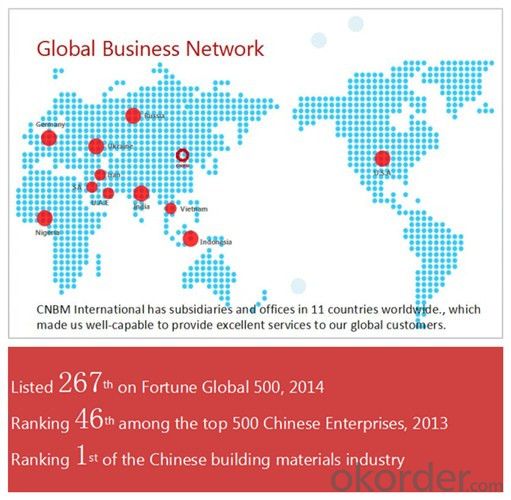
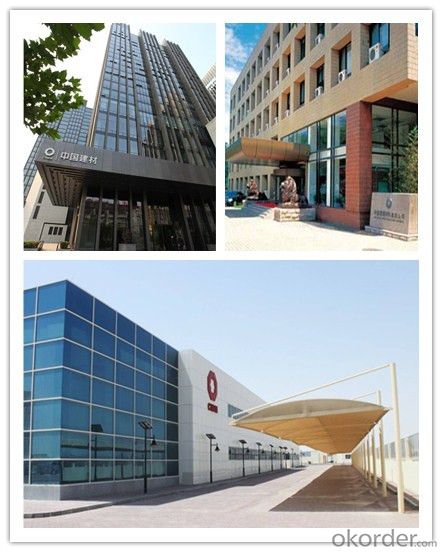
Certificates of Hot Work Die Steel Round Bar Grade H13 with Competitive Price
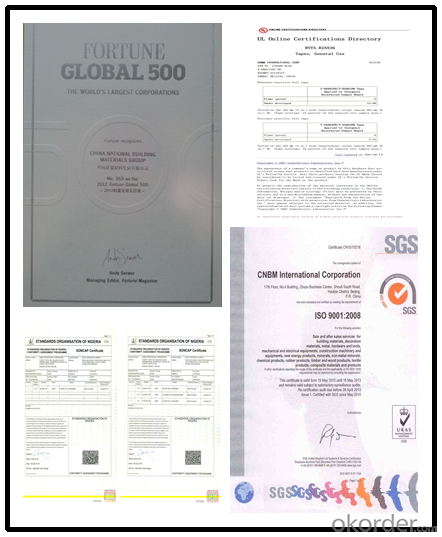
Packaging & Delivery of Hot Work Die Steel Round Bar Grade H13 with Competitive Price
Packaging Detail | Sea worthy packing /as per customer's packing instruction |
Delivery Detail | 15 ~ 40 days after receiving the deposit |
Products show of Hot Work Die Steel Round Bar Grade H13 with Competitive Price
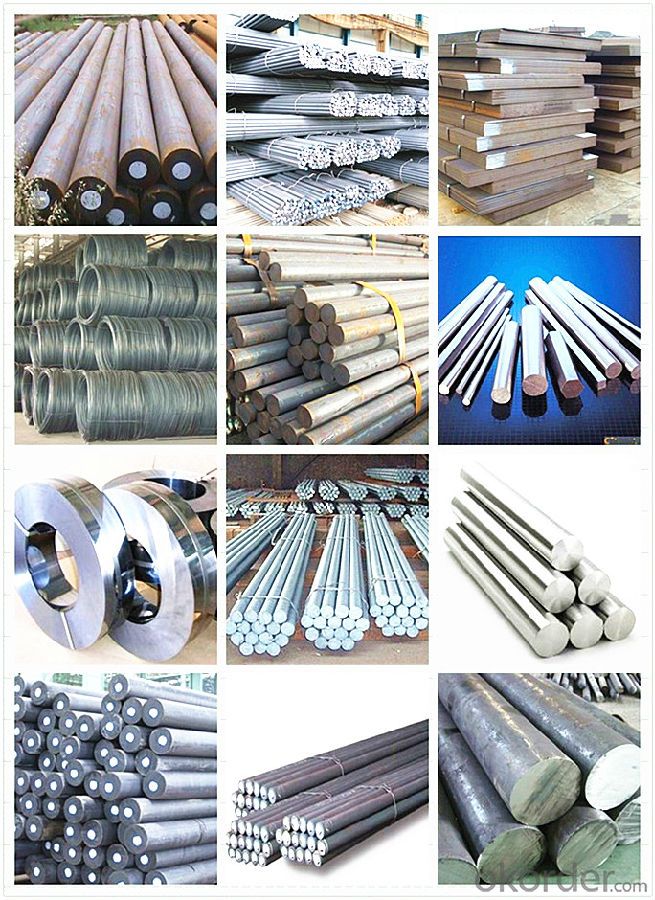
FAQ
Are you a trading company or manufacturer? | Manufacturer |
What’s the MOQ? | 3 metric ton |
What’s your delivery time? | 15-35 days after downpayment received |
Do you Accept OEM service? | Yes |
what’s your delivery terms? | FOB/CFR/CIF |
What's the Payment Terms? | 30% as deposit,70% before shipment by T/T |
Western Union acceptable for small amount. | |
L/C acceptable for large amount. | |
Scrow ,Paybal,Alipay are also ok | |
Why choose us? | Chose happens because of quality, then price, We can give you both. Additionally, we can also offer professional products inquiry, products knowledge train (for agents), smooth goods delivery, excellent customer solution proposals. |
What's your available port of Shipment? | Main Port, China |
What’s your featured services? | Our service formula: good quality+ good price+ good service=customer's trust
|
Where are your Market? | Covering more than 160 countries in the world |
- Q: What are the different methods for improving the toughness of tool steels used in special steel?
- Tool steels used in special steel applications can be toughened through various methods. The goal is to increase their resistance to fracture and ability to absorb energy without becoming brittle. Some techniques for improving the toughness of tool steels include: 1. Alloying: Adding specific alloying elements like chromium, molybdenum, vanadium, and tungsten significantly enhances the toughness. These elements form carbides within the steel matrix, improving toughness. 2. Heat treatment: Proper heat treatment greatly improves toughness. Quenching and tempering are commonly used processes. Quenching rapidly cools the steel, resulting in a hardened structure. Tempering involves reheating and slow cooling to relieve internal stresses and increase toughness. 3. Controlled cooling rates: Optimizing toughness is possible by controlling the cooling rate during heat treatment. Slow cooling allows for a more uniform microstructure, leading to improved toughness. 4. Grain refinement: Refining the grain size enhances toughness. This can be achieved through hot working, controlled rolling, or adding grain refining elements like titanium or zirconium. 5. Surface treatments: Shot peening or nitriding can improve toughness. Shot peening bombards the steel surface with small metal or ceramic particles, creating compressive residual stresses that enhance toughness. Nitriding diffuses nitrogen into the surface, forming a hard and wear-resistant layer. 6. Cryogenic treatment: Subjecting the tool steel to extremely low temperatures for an extended period refines the microstructure and reduces residual stresses, improving toughness. 7. Powder metallurgy: Techniques like hot isostatic pressing or sintering can produce tool steels with improved toughness. Fine powder, high pressure, and temperature result in a more uniform and fine-grained microstructure, increasing toughness. Ultimately, the specific methods selected and combined depend on the tool steel's requirements and intended application. By carefully considering these techniques, manufacturers can enhance the toughness of tool steels for demanding special steel applications.
- Q: Can special steel be used in the energy sector?
- Yes, special steel can be used in the energy sector. Special steel, which is engineered and designed to have specific properties like high strength, corrosion resistance, and heat resistance, can be utilized in various applications within the energy sector. It can be used for manufacturing components of power plants, such as turbines, generators, boilers, and heat exchangers, as well as in offshore oil and gas platforms, pipelines, and wind turbines. The unique properties of special steel make it suitable for withstanding the demanding conditions and requirements of the energy sector, ensuring reliability and longevity of these critical infrastructure components.
- Q: How is magnetic stainless steel used in the production of magnetic components?
- Magnetic stainless steel is commonly used in the production of magnetic components due to its unique combination of corrosion resistance and magnetic properties. It is often used to create parts such as magnetic housings, casings, or brackets that require both magnetic functionality and durability against rust or oxidation. The magnetic properties of this type of stainless steel allow for efficient and precise functioning of these components in various applications, including motors, generators, sensors, and magnetic assemblies.
- Q: How does special steel contribute to the renewable energy equipment industry?
- Special steel plays a crucial role in the renewable energy equipment industry by providing the necessary strength, durability, and corrosion resistance required for various components. One of the key applications of special steel in this industry is in wind turbines. Wind turbine towers, blades, and gearboxes are all manufactured using special steel alloys due to their high tensile strength and resistance to fatigue. This enables wind turbines to withstand the harsh environmental conditions and operate efficiently for prolonged periods. Moreover, special steel is also extensively used in the production of solar power equipment. Solar panels are often framed using stainless steel, which offers excellent corrosion resistance and structural stability, ensuring their longevity and performance in outdoor environments. Additionally, special steel alloys are employed in the manufacturing of solar trackers, which enable solar panels to follow the sun throughout the day, optimizing their energy generation potential. In the hydroelectric power industry, special steel is employed in the construction of turbine components, such as blades, shafts, and casings. These components are subjected to high pressures, water flow, and abrasive wear, making the use of special steel essential to ensure their reliability and longevity. Furthermore, special steel is also utilized in the production of energy storage systems, such as batteries and fuel cells. These technologies require materials with high conductivity, corrosion resistance, and mechanical strength, making special steel alloys ideal for their construction. Overall, special steel contributes significantly to the renewable energy equipment industry by providing the necessary strength, durability, and corrosion resistance required for various components. Its utilization in wind turbines, solar panels, hydroelectric power systems, and energy storage technologies ensures the reliability and longevity of these equipment, ultimately promoting the growth and sustainability of the renewable energy sector.
- Q: How does precipitation-hardening steel achieve high strength through heat treatment?
- Precipitation-hardening steel achieves high strength through heat treatment by a process called aging. After the steel is initially heat-treated, it is cooled quickly to form a supersaturated solid solution. This solution contains a high concentration of alloying elements. When the steel is reheated to a lower temperature, these alloying elements precipitate out, forming small particles within the steel matrix. These precipitates act as obstacles to dislocation movement, which in turn increases the strength of the steel. The size, distribution, and density of these precipitates can be controlled through the heat treatment process, allowing for the desired strength and hardness to be achieved in the final product.
- Q: What are the specific requirements for special steel used in the textile industry?
- The specific requirements for special steel used in the textile industry include high tensile strength, corrosion resistance, and the ability to withstand high temperatures. Additionally, the steel should have good wear resistance and be able to maintain its shape and strength even under continuous use and exposure to harsh conditions.
- Q: How does special steel contribute to the automotive fuel efficiency?
- Special steel contributes to automotive fuel efficiency in several ways. Firstly, special steel is lighter and stronger than traditional steel, allowing for the use of thinner and lighter components in the vehicle's structure. This reduces the overall weight of the vehicle, which in turn reduces the amount of fuel needed to propel it. Additionally, special steel can be used to create more aerodynamic designs, reducing air resistance and improving the vehicle's fuel efficiency. Furthermore, special steel can be used in the manufacturing of high-efficiency engines, improving their performance and reducing fuel consumption. Overall, the use of special steel in the automotive industry helps to create lighter, more aerodynamic, and more fuel-efficient vehicles.
- Q: What are the different welding techniques for special steel?
- There are several different welding techniques that can be used for special steel, depending on the specific requirements and characteristics of the steel. Some of the commonly used welding techniques for special steel include: 1. Shielded Metal Arc Welding (SMAW): Also known as stick welding, SMAW uses a consumable electrode coated in flux to create an arc between the electrode and the base metal. This technique is versatile and can be used for a wide range of steel types, including special steel. 2. Gas Metal Arc Welding (GMAW): Also known as MIG (Metal Inert Gas) welding, GMAW uses a continuous solid wire electrode and a shielding gas to protect the weld from atmospheric contamination. This technique is commonly used for thinner special steel materials. 3. Flux-Cored Arc Welding (FCAW): Similar to GMAW, FCAW uses a continuous tubular electrode filled with flux. This flux provides additional shielding and can allow for higher deposition rates. FCAW is suitable for special steel with thick sections or when welding in outdoor or windy conditions. 4. Gas Tungsten Arc Welding (GTAW): Also known as TIG (Tungsten Inert Gas) welding, GTAW uses a non-consumable tungsten electrode and a shielding gas. This technique is known for its precision and is often used for special steel alloys that require high-quality and aesthetically pleasing welds. 5. Plasma Arc Welding (PAW): PAW is similar to GTAW but uses a more focused arc created by passing gas through a constricted nozzle. This technique is often used for special steel alloys that have higher melting temperatures or require deeper penetration. 6. Submerged Arc Welding (SAW): SAW involves feeding a continuous wire electrode into a molten flux layer that covers the weld. This technique is commonly used for heavy and thick special steel sections, as it provides excellent penetration and high deposition rates. It is important to choose the most appropriate welding technique for special steel based on factors such as the steel composition, thickness, intended application, and desired weld quality. Consulting with a qualified welding professional or referring to the steel manufacturer's recommendations can help ensure the best welding technique is selected for the specific special steel being used.
- Q: What is the maximum temperature that special steel can withstand?
- The maximum temperature that special steel can endure relies on the particular steel type employed. Special steels are engineered to possess improved qualities, including heightened resistance to heat, enabling them to endure higher temperatures in comparison to standard steels. To illustrate, certain special steels, like heat-resistant stainless steels, can withstand temperatures of approximately 1200 degrees Celsius (2200 degrees Fahrenheit). These steels are frequently utilized in scenarios where high temperatures are encountered, such as in furnaces, boilers, and exhaust systems. Different types of special steels, such as tool steels or high-speed steels, may have varying limits on their maximum temperature. These steels are commonly employed in cutting tools, molds, and machining applications, where they must maintain their hardness and strength at elevated temperatures. It should be noted that the maximum temperature that special steel can endure is also influenced by factors such as the duration of exposure to high temperature, the specific composition of the alloy, and any additional processes of heat treatment applied. Therefore, it is vital to refer to the manufacturer's specifications or seek professional advice to obtain accurate information regarding the maximum temperature limit for a specific type of special steel.
- Q: How does special steel contribute to the transportation industry?
- Special steel plays a crucial role in the transportation industry by providing materials with enhanced strength, durability, and resistance to various environmental factors. This type of steel is used in the manufacturing of components and structures for vehicles, such as engines, axles, suspension systems, and body frames. Its high tensile strength allows for lighter and more fuel-efficient designs, while offering superior safety and performance. Additionally, special steel's corrosion resistance properties help prolong the lifespan of transportation equipment, reducing maintenance costs and enhancing overall reliability.
Send your message to us
Hot Work Die Steel Round Bar Grade H13 with Competitive Price
- Loading Port:
- Shanghai
- Payment Terms:
- TT OR LC
- Min Order Qty:
- 3 m.t.
- Supply Capability:
- 100000 m.t./month
OKorder Service Pledge
OKorder Financial Service
Similar products
Hot products
Hot Searches
Related keywords
